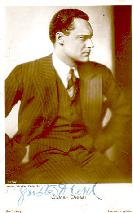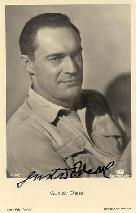Diessl, Gustav |
| ACTOR (AUSTRIA) |
|
BORN 30 Dec 1899, Wien - DIED 20 Mar 1948, Wien CAUSE OF DEATH stroke GRAVE LOCATION Wien: Döblinger Friedhof, Hartäckerstraße 65 (Gruppe 28, Reihe 1, Nummer 6) |
|
Gustav Diessl studied painting and sculpture at the Kunstgewerbeschule in Vienna. In 1916 he started working as an actor in Vienna, but soon he had to join the army and was held prisoner for a year during the First World War. On recommendation of G.W. Pabst, in 1921 he played in his first film "In Banne der Kralle". He made several more films with Pabst. In 1928 he starred in "Abgründe", in 1929 in "Die Büchse der Pandora" ("Pandora's Box", with Louise Brooks) and in 1929 in "Die Weiße Hölle vom Piz Palü" (with Leni Riefenstahl). This last movie made him really famous and was the first of a series of mountain movies that became very popular in Germany. He was able to remain popular in the thirties as well as in the thirties and played in "Das Testament des Dr. Mabuse" (1933, directed by Fritz Lang), "Kolberg" (1944, directed by Veit Harlan) and "Der Prozess" (1948, directed by Pabst). After his first marriage failed, he lived for several years with actress Camilla Horn, but in 1938 he married the soprano Maria Cebotari. After two strokes he died in 1948, leaving his wife and their two young sons behind. Maria Cebotari died only one year later of liver cancer. Family • Wife: Cebotari, Maria (1938-1948) Related persons • lived with Horn, Camilla • was directed by Pabst, George Wilhelm |
| Images |







